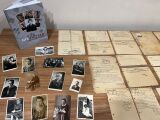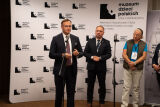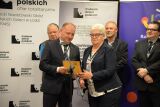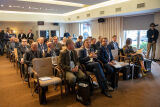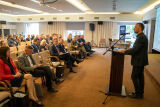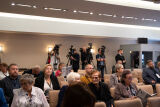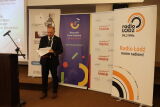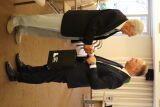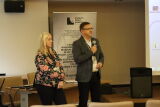back...Summary of the 1st scientific and didactic conference
‘I still have some images from those terrible days under my eyelids. For many years I didn’t know what was memory and what was imagination,’ said Jerzy Jeżewicz, a former inmate of the children’s camp on Przemysłowa Street in Łódź, during the 1st scientific and didactic conference of the Museum of Polish Children – victims of totalitarianism.
Harsh corporal punishment, a constant feeling of hunger and constant fear – these are words that were repeatedly uttered by former prisoners recalling the camp on Przemysłowa Street in Łódź. The occasion for this topic was the “1st scientific and didactic conference of the Museum of Polish Children – victims of totalitarianism. Polen-Jugendverwahrlager Litzmannstadt in the context of German crimes against Polish children during World War II”.
‘We were given black coffee and a thick slice of bread – that was all our food,’ said Helena Leszyńska, a survivor of the German camp for Polish children on Przemysłowa Street in Łódź.
‘I was 2.5 years old at the time, and my brother was less than 4 years old (...). I still have some images from those terrible days under my eyelids. For many years I didn’t know what was memory and what was imagination, only later, after contact with other survivors, did things start to fall into place. Until now, however, I find it difficult to talk about it,’ assessed Jerzy Jeżewicz, a survivor.
The topic of children who had been taken from their parents and deported abroad was also raised.
‘A selection was made. The children were taken to Germany, then their identities were changed,’ explained dr Ireneusz Piotr Maj, director of the Museum of Polish Children – victims of totalitarianism in Łódź.
At the conference, the issue was also raised of the German war crimes in occupied Poland being not settled yet.
‘Unaccounted-for German crimes are decades of oblivion about the extraordinary families and children of that period. The children were condemned to death or had to grow up in harsh, even inhumane conditions,’ assessed Mikołaj Pawlak, Ombudsman for Children.
The survivors also expressed their concern over the lack of a decision on the part of the city authorities regarding the allocation of real estate for the construction of a new site for the Museum of Polish Children – victims of totalitarianism, located on the premises of the former camp. They stressed that their dream was to live to see the day when a museum would be built on Przemysłowa Street as a memorial to their wrongs inflicted by the Germans.
‘It really takes a very long time. May we only live to see it. May we, the survivors, live to see the construction of the Museum building. There is help from the government, the Minister of Culture and the care of the Museum of Polish Children. Urgent action by the Łódź authorities is needed,’ stressed the Survivors’ representative.
Museum staff presented for the first time a list of about 700 Polish children – victims of German camps located in Łódź and the surrounding area. It was created on the basis of an archive search compiled by them.
During the two-day conference, numerous speakers presented the results of research focusing on topics related to the suffering of the youngest victims of World War II.
The event concluded with the launch of a book titled “Niezwykła polska rodzina. Losy Gertrudy Nowak – dziecka z obozu na Przemysłowej” [“An extraodrinary Polish family. The fate of Gertruda Nowak – a child from the camp on Przemysłowa Street”]. The publication was compiled on the basis of the personal file of Ms Gertruda Nowak. The documents were officially handed over at the conference by the children of a former inmate of the camp on Przemysłowa Street in Łódź.

